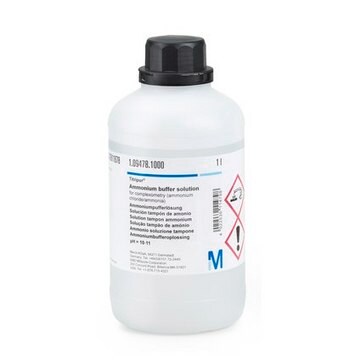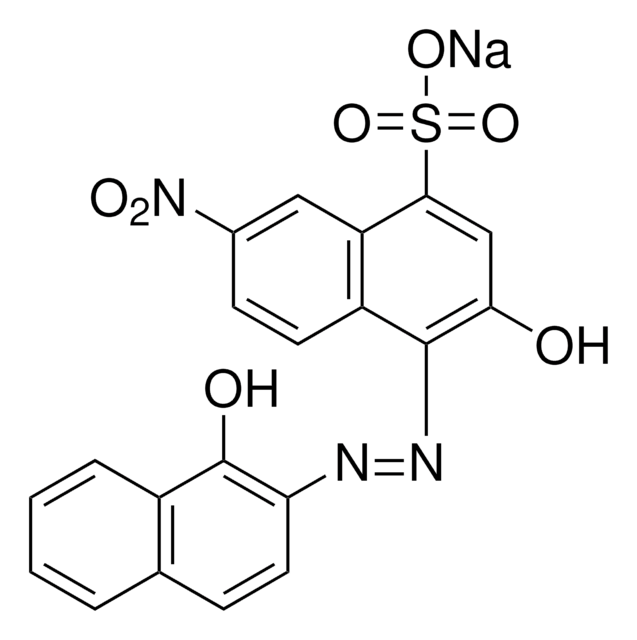318604
Ammonium chloride-ammonium hydroxide buffer solution
in H2O
Synonym(s):
Ammonium Buffer Solution
Sign Into View Organizational & Contract Pricing
All Photos(1)
About This Item
Recommended Products
form
liquid
Quality Level
composition
NH4Cl, 1 wt. %
NH4OH, 4 wt. % (pH 10 to 11)
concentration
in H2O
pH
10-11
density
0.99 g/mL at 25 °C
SMILES string
N.N.O.Cl
InChI
1S/ClH.2H3N.H2O/h1H;2*1H3;1H2
InChI key
XEXFVRMLYUDDJY-UHFFFAOYSA-N
Application
Ammonium chloride-ammonium hydroxide buffer solution may be used to crystallize proteins.
Biochem/physiol Actions
Ammonium chloride is the salt component of ammonium chloride-ammonium hydroxide buffer system that completely inhibits the BVDV infection of MDBK cells when present at a concentration of 50 mM . Viruses treated with ammonium chloride (NH4Cl) results in loss of infectivity because it neutralizes the pH of endosome. Hence, viruses with low pH-dependent fusion activity became incapable to fuse their envelope with endosomal membrane.
Signal Word
Danger
Hazard Statements
Precautionary Statements
Hazard Classifications
Aquatic Acute 1 - Aquatic Chronic 2 - Eye Dam. 1 - Skin Irrit. 2
Storage Class Code
12 - Non Combustible Liquids
WGK
WGK 2
Flash Point(F)
Not applicable
Flash Point(C)
Not applicable
Choose from one of the most recent versions:
Already Own This Product?
Find documentation for the products that you have recently purchased in the Document Library.
Customers Also Viewed
Thomas Krey et al.
Journal of virology, 79(7), 4191-4200 (2005-03-16)
The route of internalization of the pestivirus bovine viral diarrhea virus (BVDV) was studied by using different chemical and biophysical inhibitors of endocytosis. Expression of the dominant-negative mutant Dyn(K44A) of the GTPase dynamin in MDBK cells, as well as the
A Takada et al.
Proceedings of the National Academy of Sciences of the United States of America, 94(26), 14764-14769 (1998-02-07)
Ebola virus causes hemorrhagic fever in humans and nonhuman primates, resulting in mortality rates of up to 90%. Studies of this virus have been hampered by its extraordinary pathogenicity, which requires biosafety level 4 containment. To circumvent this problem, we
Julia S Brunner et al.
Nature communications, 11(1), 431-431 (2020-01-24)
Multinucleated giant cells (MGCs) are implicated in many diseases including schistosomiasis, sarcoidosis and arthritis. MGC generation is energy intensive to enforce membrane fusion and cytoplasmic expansion. Using receptor activator of nuclear factor kappa-Β ligand (RANKL) induced osteoclastogenesis to model MGC
Our team of scientists has experience in all areas of research including Life Science, Material Science, Chemical Synthesis, Chromatography, Analytical and many others.
Contact Technical Service









